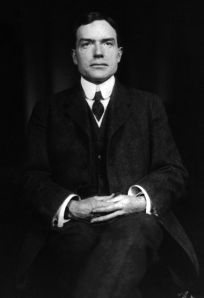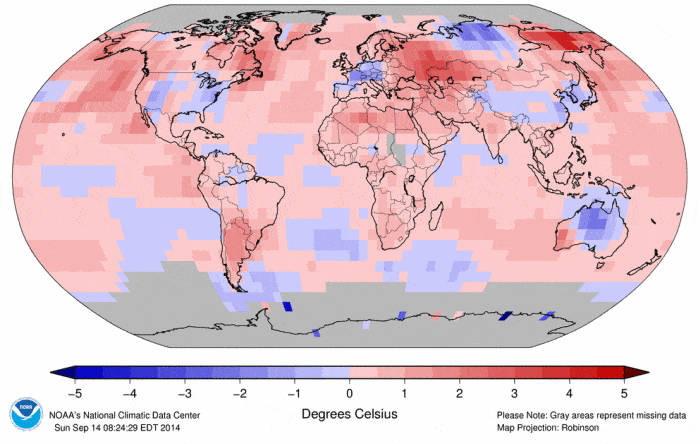For 140 years, the Rockefellers were the oil industry’s first family, scions of a business empire that spawned companies called Exxon, Mobil, Amoco and Chevron. So it was no trivial matter when a group of Rockefeller heirs decided recently to begin severing financial ties to fossil fuels.
“There is a moral imperative to preserve a healthy planet,” said Valerie Rockefeller Wayne, a great-great-granddaughter of oil magnate John D. Rockefeller, Sr. and a trustee in the largest charitable foundation in which the family still plays the leading role.
On Monday, the foundation, known as the Rockefeller Brothers Fund, will formally announce plans to begin divesting itself of fossil-fuel stocks, citing concerns about climate change. The symbolic cutting of ties to a key part of the family’s heritage is being timed with the start of another symbolism-laden event: a gathering of world leaders to grapple with the environmental consequences of decades of fossil-fuel burning.
U.S. President Barack Obama will join heads of state from more than 120 countries Tuesday at an unusual climate summit convened by U.N. Secretary-General Ban Ki-moon. The meeting in New York is aimed at persuading governments to do more to reduce emissions of greenhouse gases in the face of new evidence of an accelerating buildup of heat-trapping carbon dioxide in the atmosphere.
The high-level gathering — the biggest since a troubled round of international climate negotiations in Copenhagen five years ago — is likely to underscore the diplomatic and political difficulties ahead as the governments seek to hammer out a treaty limiting global greenhouse gas emissions by late next year. The Obama administration separately faces tough negotiations with overseas trading partners China and India over proposed cuts in fossil-fuel burning, while also defending its climate policies against attacks from Republican opponents in Washington.
But the perception of halting progress on climate politics stands in sharp contrast with an increasingly energetic movement that will be on display on the summit’s periphery. An unlikely coalition of groups — including corporate executives, philanthropists and urban planners — are in New York this week to showcase practical steps being implemented to address the causes of climate change and mitigate its effects.
Entrepreneurs and businesses will promote technology breakthroughs that are making wind and solar power competitive with more traditional energy sources in some parts of the country. And investors and foundations with collective holdings in the tens of billions of dollars will formally join a global “divest-invest” movement that seeks to shift capital from fossil-fuel extraction to renewable energy.

New participants in the movement, such as the Rockefeller Brothers Fund, say their decision reflects not only concerns about the environment but also a belief that renewables are becoming an increasingly sound investment at a time of growing uncertainty about the future of fossil fuels such as coal.
“The action we’re taking is symbolism but it is important symbolism,” said Stephen Heintz, the president of the Rockefeller Brothers Fund, which controls nearly $900 million in assets. “We’re making a moral case, but also, increasingly, an economic case.”
The summit’s formal events are playing out against a boisterous backdrop that includes thousands of activists and protesters. On Sunday, a crowd estimated by organizers at more than 300,000 marched through central Manhattan in what was believed to be the biggest climate-related demonstration ever held. The massive rally, which was mirrored by smaller protests in other cities around the globe, drew not only environmental activists but also university students, labor groups, A-list Hollywood celebrities such as actors Leonardo DiCaprio and Mark Ruffalo, and politicians including New York Mayor Bill de Blasio, D.
“Our mission is to make this a decisive moment and a turning-point moment, and I felt today that I was seeing history starting to be made,” De Blasio told reporters.
But several key names are missing from this week’s summit. China, the world’s biggest emitter of greenhouse gases, will be represented by its vice premier, Zhang Gaoli, rather than President Xi Jinping. India’s Prime Minister Narendra Modi likewise will skip the gathering, although he is expected to discuss climate change during an official visit to the White House this month. Several European governments are being represented by foreign ministers or other senior cabinet officers.
The absences of the heads of state of some of the world’s biggest emitters of greenhouse gases has led skeptics of the U.N. climate treaty process to belittle the New York gathering as a meaningless exercise in public relations.
“President Obama has pledged to be at the Summit. The leaders of China, India, Australia, Germany, Canada, among others, have better things to do,” Patrick Michaels, a climatologist at the Cato Institute, a libertarian-leaning think tank, wrote in a blog post last week.
The Obama administration is seeking to use the summit to showcase its achievements in reducing U.S. carbon emissions while publicly urging other countries to do more. The White House will tout efforts to raise fuel-economy standards for the automotive industry and reduce pollution from coal-burning utilities, as well as more recent, voluntary initiatives to encourage investment in solar energy and phase out production of heat-trapping hydrofluorocarbons widely used in air conditioners.
“We are taking the summit seriously, both to show the world that the United States is committed to leading the fight against climate change and to call on other leaders to do the same,” White House counselor John Podesta told reporters last week.
While acknowledging formidable challenges in international climate negotiations as well as from a skeptical Congress, administration officials say they plan a more aggressive push in the weeks ahead. Adding urgency, the officials said, are new scientific findings that show record growth in concentrations of greenhouse gases in the atmosphere, along with new evidence of changes in weather patterns and ocean chemistry. The National Oceanic and Atmospheric Administration last week reported that, despite unusually cool weather in the eastern United States, global average temperatures over the summer were the highest since detailed record-keeping began in the 1880s, putting 2014 on a track for being the hottest year in historical time.
“Across the country and around the world, people are grappling with drought and wildfires and severe weather,” Podesta said. “So we don’t have time to dabble in climate denial.”

The increased emphasis on climate change also reflects shifting political realities. While large majorities in the U.S. Congress — including nearly all Republicans and many leading Democrats — have voiced opposition to binding international treaties on greenhouse-gas emissions, opinion polls have showed growing concern over climate change in a year in which the Northeast continues to repair the damage from 2012’s Hurricane Sandy, while the country’s Western half wilts under epic heat and record droughts.
“The administration is beginning to see a large political opportunity as the GOP appears stuck in what I call ‘climate nihilism,’ ” said Paul Bledsoe, a former Clinton White House climate aide now a senior fellow on energy at the German Marshall Fund. “On both political and policy grounds, they see a need to be aggressive and to prompt popular activism and international action.”
The shifting politics is partially a reflection of a transformation in the priorities and tactics of environmental groups leading the fight for more aggressive climate policies. Once dominated by legal, legislative and regulatory strategists, the major environmental organizations have poured money into local politics while also attempting to broaden their base, encouraging people at local levels to engage in civil disobedience as well as fund-raising and legal action.
The green movement was galvanized by the fight over the proposed Keystone Pipeline, as activists, led by Middlebury College Professor Bill McKibben, seized on the controversy to mobilize college students and encourage divestment to block construction of the proposed conduit that would transfer crude from Canadian oil sands to refineries in the Gulf of Mexico. Other major groups, such as the Sierra Club and the Natural Resources Defense Council, have increasingly promoted citizen activism to protest coal-burning projects. On the electoral front, the League of Conservation Voters plans to spend $25 million in this election cycle, five times more than it did in the 2010 midterm elections, with much of the money going to state contests.
Key industries also have shown increased sensitivity to climate politics, agreeing in some cases to work with the Obama administration in adopting voluntary curbs on emissions. On Monday, the State Department will trumpet an initiative that commits companies to taking further steps to reduce methane emissions from oil and natural gas operations. In the 10 months since State Department officials first approached energy firms about its Climate and Clean Air Coalition Oil and Gas Methane Partnership, six have agreed to take part, including Southwestern Energy, the fourth-largest U.S. natural gas producer, as well as the British firm BG Group and Norway’s Statoil.
“We believe that it’s much better that the companies are proactive,” said Helge Lund, chief executive of Statoil. “In that way, perhaps we’ll be able to impact the direction so we can have as rational and market-based solutions as possible.”
The recent decisions by energy firms and elite financial organizations have helped reinforce perceptions of a cultural shift, even though the divest movement has not significantly altered the course of big oil and gas companies that remain convinced that the increasing appetite for energy in rapidly developing nations will outpace any increase in renewable energy. Still, on the eve of the U.N. summit, leaders of the divest-invest initiative prepared to release a long list of new participants in a campaign that now includes 180 institutions and local governments as well as nearly 700 individuals, collectively representing $50 billion in assets. Of the many additions, the Rockefeller Brothers Fund stood out because of historical ties to one of the world’s great oil empires.
Wayne, the Rockefeller descendant now on the fund’s board of trustees, said her foundation would first divest its assets from industries involved in coal and tar-sands mining, followed by a more gradual disengagement from other fossil-fuel stocks. Some family members continue to hold stock in Exxon Mobil — a modern descendant of the Standard Oil company co-founded by her great-great-grandfather in the 1870s — and several have used their status as shareholders to launch proxy campaigns to encourage the company to adopt more environmentally friendly policies, Wayne said.
“This is part of a natural progression for us,” said Wayne, who marched Sunday with her three children in the pre-summit demonstration in New York.
Wayne said she felt certain that her famous ancestor would approve. In their lifetimes, both the Standard Oil founder and his son, the philanthropist John D. Rockefeller Jr., were ardent supporters of conservation causes, purchasing huge swaths of ranch land and donating them to the federal government to create some of the U.S.’ first wilderness preserves for future generations to enjoy.
If the elder Rockefeller were alive today, she said, he would be “investing in alternative energy sources and renewables right now.”
Steven Mufson covers energy and other financial news.
© 2014, The Washington Post

